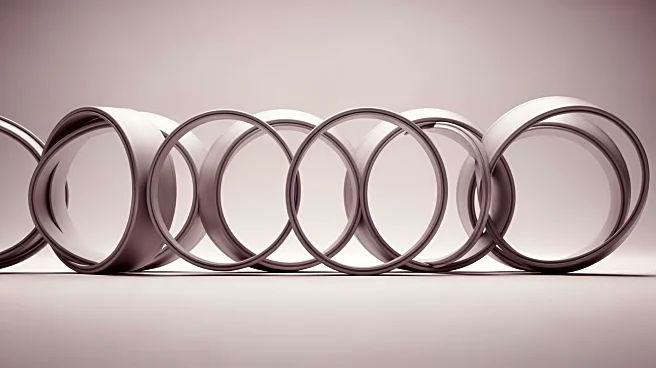What's Happening?
The circular fashion retail industry is adopting a model where clothing and textiles are designed, manufactured, used, and eventually recycled back into the industry, rather than being discarded. This
approach aligns with the principles of a circular economy, which aims to minimize waste by maximizing resource efficiency and keeping materials in use for as long as possible. Brands like Patagonia and Eileen Fisher are embracing circular practices by offering repair programs and recycling garments, helping extend the life cycle of clothing. Circular fashion promotes long-lasting, reusable, and recyclable clothing, aiming to create a sustainable fashion model that benefits the environment, economy, and society.
Why It's Important?
Circular fashion is crucial for reducing the environmental impact of the fashion industry, which contributes roughly 10% of global carbon emissions. By adopting circular practices, the industry can combat climate change by reducing greenhouse gas emissions and minimizing its overall environmental footprint. Circular fashion also helps conserve resources, as less demand for new production means fewer natural resources are extracted. This model addresses the immense waste generated by the fashion industry, promoting a closed-loop system where products are kept in use for as long as possible, reducing waste and the need for new resources.
What's Next?
The future of circular fashion looks promising as both consumers and brands continue to embrace sustainability. With growing awareness about the environmental impact of fast fashion, circular fashion is gaining momentum through its focus on reusing, recycling, and redesigning. Consumer demand for sustainable fashion is driving the rise of circular practices, with the resale and rental markets expanding rapidly. More brands are expected to embrace circular fashion by designing for longevity, encouraging repairs, and using fashion business intelligence tools to reduce overproduction.
Beyond the Headlines
Circular fashion not only offers environmental benefits but also presents economic opportunities within the industry. The emergence of innovative startups focused on sustainable materials and recycling technologies can create jobs in repair, refurbishment, and recycling sectors. Additionally, circular fashion encourages transparency in supply chains, ensuring that each step of the production process aligns with sustainable practices. This often includes ethical labor practices, fair wages, and minimizing waste and pollution in production.









